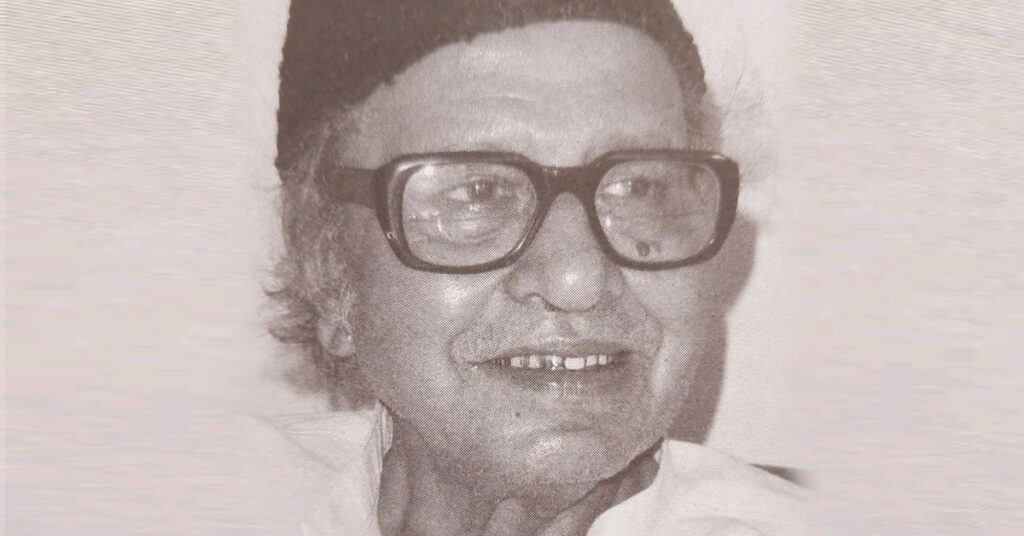‘Aghonar Kunwali’ of Keshab Mahanta
‘Aghonar Kunwali’ (The Mists of Aghon) of Keshab Mahanta (b.1926-d.2006) is an important Assamese poem, in which Assamese folk life, language and nature have played a pivotal role. Two of our translators have translated this poem into English. The readers can see that the same poem translated by two experts have produced two different versions. As there can be no ultimate novel or a poem, there can be no ultimate translation also.

আঘোণৰ কুঁৱলী কেশৱ মহন্ত আঘোণৰ কুঁৱলীয়ে বাট ভেটি কৰিছে আমনি, একোকে নমনি। কুঁৱলী নথকা হ’লে দেখিলোঁহেঁতেন বা পতা-সোণ-বৰণীয়া ধানৰ আঁচল, দেখিলোঁহেঁতেন বা লিহিৰি লিহিৰি ঢেৰ আঙুলিৰে মুঠি মৰা কেছ্ কেছ্, চিকমিক, খৰ কাচিবোৰ, দেখিলোঁহেঁতেন বা খোপাবন্ধা মূৰবোৰ ওপৰলে’ তুলিবৰে সময় নোপোৱা। দেখিলোঁহেঁতেন বা পতা-সোণ পথাৰত লঘু পৰিহাসময় হাঁহিবোৰ তেল-হালধীয়া!! অলপ দূৰৰপৰা নোচোৱাৰ ভাও ধৰি চাবওতো পাৰিলোঁহেঁতেন এইজাক দাৱনিৰ মাজতে আছিলে নেকি সেউতীও মোৰ!! আঘোণৰ কুঁৱলীয়ে বাট ভেটি কৰিছে আমনি, একোকে নমনি। তথাপিও নোৱাৰিনে গম ল’ব বাৰু এমোকোৰা তামোলৰ পিক-ৰঙা ওঁঠে ওঁঠে সোতৰ বছৰ হোৱা 'মোক তোল আঘোণ'ৰ ডালিমী দাঁতত ডাঙৰি বন্ধাৰ লগ বিচাৰি, বিৰিঙা তেল আৰু হালধিৰ ‘যাঃ’ বুলি ঠেলা মৰা খিল-খিল হাঁহি? আঘোণৰ কুঁৱলীয়ে কৰিছে আমনি। আঘোণৰ পথাৰত দাৱনিৰ কাম আছে মুঠি মুঠি, কাচি কাচি, ডাঙৰি ডাঙৰি, কাম আছে, আঘোণৰ পথাৰত কাম আৰু কাম। আঘোণৰ আকাশেদি কোনোবা বিললে’ মন কাঢ়ি বন-হাঁহ জাকি মাৰি গ’ল। আঘোণৰ আকাশতো উৰুলিৰ ৰাগি আছে, ৰাগি আছে, আঘোণৰ আকাশত ৰাগি আৰু ৰাগি। আঘোণৰ বাটটোহে কুঁৱলীৰে ঢকা। মন-হাঁহ খেদি খেদি বন শেষ হ’ল আঘোণৰ কুঁৱলীয়ে বাট ভেটি ল’লে। (বৌদেউ! আপুনি যে কৈছিলে সেউতীৰ কথা! মোৰ কথা সেউতীক কৈছিলে জানো?) আঘোণৰ কুঁৱলীত ধাননি লুকালে আঘোণৰ কুঁৱলীয়ে দাৱনি ঢাকিলে আঘোণৰ কুঁৱলীতে সেউতী হেৰালে ডাঙৰি বান্ধিম বুলি তৰাজৰী তোলাতে থাকিল!!
Also read: Challenges of Translating
The Wintry Fog By Keshav Mahanta The wintry fog impedes the way Causing a lot of annoyance; Nothing is visible. Had there been no fog, Perhaps I'd have seen the golden-hued selvedge of paddy, Perhaps I'd have seen the swift-flashing scythes In myriad grips of slender fingers, Perhaps I'd have seen many unraised heads with knotted buns Without a moment of recess, Perhaps I'd have seen in the golden fields The light-hearted jestful laughter, yellow as mustard! From a little distance away, with all pretension of disinterest I could have had a peek to find If my Seuti was there among the reapers! The wintry fog impedes the way Causing a lot of annoyance; Nothing is visible. Still couldn't I've an inkling of the oil and turmeric-oozing titters After the mild shove for company for tying the paddy-sheaves In the seventeen-year-old 'pick me up' winter's pomegranate teeth Behind the lips smeared with betel-spittle. The wintry fog is causing a lot of annoyance. In the wintry fields, the reapers have a lot to do: Fistful grips, scythes, sheaves have no respite; It's just work and work in the wintry fields. Across the wintry sky, heading towards some lake, A flock of wild ducks stole my mind. The wintry sky too is an inebriation of trillings. Inebriation— It's all inebriation and inebriation in the wintry sky. Only the wintry path is shrouded by fog. While pursuing the ducks of the mind, the wilderness ended. The wintry fog impeded my way. (Boudeo*! You've told me about Seuti! Have you told her about me?) The wintry fog hid the paddy fields, The wintry fog veiled the reapers, In the wintry fog, Seuti was lost, The Tora* cords for binding sheaves lay in disuse. _______________________ * Boudeo -- wife of elder brother (sister-in-law). * Tora -- herbaceous plant (Alpinia nigra).
Translated by Krishna Dulal Barua
Also read: Translation — a bridge between cultures
The Mists of Late Autumn by Keshab Mahanta The mists of late Autumn are vexing me obstructing the path Nothing is visible. Had the mists not been there I might have seen the thin-gold-coloured wavy edge of the paddy field, Might have seen the rustling, glinting, rapid sickles in the grip of many dainty fingers, might have seen the heads with knotted hair not getting time to raise. Might have seen in the thin-gold paddy fields the bantering smiles that are dark yellow!! Pretending I was not looking at from a distance I could have well noticed if Annie—I yearned for— too, was there among these reapers!! Mists of late Autumn are vexing me Obstructing the path Nothing is visible. Nevertheless isn’t it possible to find out in the red lips stained by mouthful of areca nut on the seventeen-year-old ‘pick-me-up’ season’s pomegranate teeth the spreading giggles of dark yellow pushing others shyly seeking a partner for tying the bales? Mists of late Autumn are vexing. In the paddy field of late Autumn the reapers have tasks bundles, sicklefuls, balefuls of tasks There are tasks and tasks in the paddy field of late Autumn. Across the late Autumn sky to some lake the skein of wild ducks flew away snatching the mind away. In the welkin of late Autumn too there is intoxication of ululation, there is intoxication. The late Autumn sky is replete with intoxication. Only the path of late Autumn is covered with mist Chasing after the mind-duck The task is complete The mists of late Autumn blocked the path. (O my sister-in-law! You told me about Annie! Did you tell Annie about me?) The paddy field hid itself in the Autumn mist in the mists of late Autumn The mists of late Autumn have covered the reapers Its in the mists of late Autumn that Annie got lost The ropes of fibre plants remained half prepared In the thought of tying the bales!!
Translated by Uttam Duorah
Keshab Mahanta (b.1926-d.2006) was an Assamese poet, lyricist and a recipient of Sahitya Akademi award for his collection poems Mor Je Kiman Hepanh.
Krishna Dulal Barua is a prominent translator and writer based in Nagaon, Assam. He received the Katha Award for translation in 2005.
Uttam Duorah, the translator, retired as the HoD, English, Women’s College, Tinsukia and is based in Tinsukia, Assam.